Related Research Articles

John Cabell Breckinridge was an American lawyer, politician, and soldier. He represented Kentucky in both houses of Congress and became the 14th and youngest-ever Vice President of the United States. Serving from 1857 to 1861, he took office at the age of 36. He was a member of the Democratic Party, and served in the U.S. Senate during the outbreak of the American Civil War, but was expelled after joining the Confederate Army. He was appointed Confederate Secretary of War in 1865.
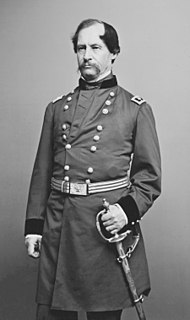
David Hunter was a Union general during the American Civil War. He achieved fame by his unauthorized 1862 order emancipating slaves in three Southern states, for his leadership of United States troops during the Valley Campaigns of 1864, and as the president of the military commission trying the conspirators involved with the assassination of U.S. President Abraham Lincoln.

In the United States before 1865, a slave state was a state in which slavery and the slave trade were legal, while a free state was one in which they were not. Between 1812 and 1850, it was considered by the slave states to be politically imperative that the number of free states not exceed the number of slave states, so new states were admitted in pairs. There were, nonetheless, some slaves in most free states up to the 1840 census, and the Fugitive Slave Act of 1850 specifically stated that a slave remained enslaved even when he fled to a free state.

Robert Mercer Taliaferro Hunter was a Virginia lawyer, politician and plantation owner. He was a U.S. Representative, Speaker of the House (1839–1841), and U.S. Senator (1847–1861). During the American Civil War, Hunter became the Confederate States Secretary of State (1861–1862) and then a Confederate Senator (1862–1865) and critic of President Jefferson Davis. After the war, Hunter failed to win re-election to the U.S. Senate, but did serve as the Treasurer of Virginia (1874–1880) before retiring to his farm. After fellow Democrat Grover Cleveland was elected President of the United States in 1884, Hunter became the customs collector for the port of Tappahannock until his death.

John Daniel Imboden, American lawyer, Virginia state legislator, and a Confederate army general. During the American Civil War, he commanded an irregular cavalry force. After the war, he resumed practicing law, became a writer, and was active in land development founding the town of Damascus, Virginia.
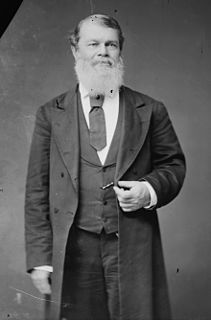
Beriah Magoffin was the 21st Governor of Kentucky, serving during the early part of the Civil War. Personally, Magoffin adhered to a states' rights position, including the right of a state to secede from the Union, and he sympathized with the Confederate cause. Nevertheless, when the Kentucky General Assembly adopted a position of neutrality in the war, Magoffin ardently held to it, refusing calls for aid from both the Union and Confederate governments.

James Bennett McCreary was an American lawyer and politician from Kentucky. He represented the state in both houses of the U.S. Congress and served as its 27th and 37th governor. Shortly after graduating from law school, he was commissioned as the only major in the 11th Kentucky Cavalry, serving under Confederate Brigadier General John Hunt Morgan during the American Civil War. He returned to his legal practice after the war. In 1869, he was elected to the Kentucky House of Representatives where he served until 1875; he was twice chosen Speaker of the House. At their 1875 nominating convention, state Democrats chose McCreary as their nominee for governor, and he won an easy victory over Republican John Marshall Harlan. With the state still feeling the effects of the Panic of 1873, most of McCreary's actions as governor were aimed at easing the plight of the state's poor farmers.

Harrison Holt Riddleberger was a Virginia lawyer, newspaper editor and politician from Shenandoah County. A Confederate States Army officer who at various times aligned with the Conservative Party of Virginia, the Readjuster Party and the Democratic Party, Riddleberger served in both houses of the Virginia General Assembly, which elected him for one term as U.S. Senator.

Henry Cornelius Burnett was an American politician who served as a Confederate States Senator from Kentucky from 1862 to 1865. From 1855 to 1861, Burnett served four terms in the United States House of Representatives. A lawyer by profession, Burnett had held only one public office—circuit court clerk—before being elected to Congress. He represented Kentucky's 1st congressional district immediately prior to the Civil War. This district contained the entire Jackson Purchase region of the state, which was more sympathetic to the Confederate cause than any other area of Kentucky. Burnett promised the voters of his district that he would have President Abraham Lincoln arraigned for treason. Unionist newspaper editor George D. Prentice described Burnett as "a big, burly, loud-mouthed fellow who is forever raising points of order and objections, to embarrass the Republicans in the House".

The U.S. state of West Virginia was formed out of western Virginia and added to the Union as a direct result of the American Civil War, in which it became the only modern state to have declared its independence from the Confederacy. In the summer of 1861, Union troops, which included a number of newly-formed Western Virginia regiments, under General George McClellan, drove off Confederate troops under General Robert E. Lee. This essentially freed Unionists in the northwestern counties of Virginia to form a functioning government of their own as a result of the Wheeling Convention. Prior to the admission of West Virginia the government in Wheeling formally claimed jurisdiction over all of Virginia, although from its creation it was firmly committed to the formation of a separate state.
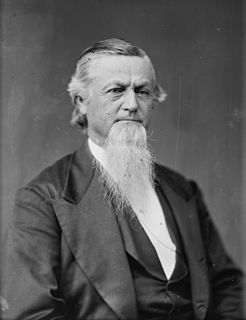
George Gibbs Dibrell was an American lawyer and a five-term member of the United States House of Representatives from the 3rd Congressional District of Tennessee. He also served as a general in the Confederate States Army during the American Civil War and as a railroad executive.
Loudoun County in the Civil War —Loudoun County, Virginia, was destined to be an area of significant military activity during the American Civil War. Located on Virginia's northern frontier, the Potomac River, Loudoun County became a borderland after Virginia's secession from the Union in early 1861. Loudoun County's numerous Potomac bridges, ferries and fords made it an ideal location for the Union and Confederate armies to cross into and out of Virginia. Likewise, the county's several gaps in the Blue Ridge Mountains that connected the Piedmont to the Shenandoah Valley and Winchester were of considerable strategic importance. The opposing armies would traverse the county several times throughout the war leading to several small battles, most notably the Battle of Balls Bluff.
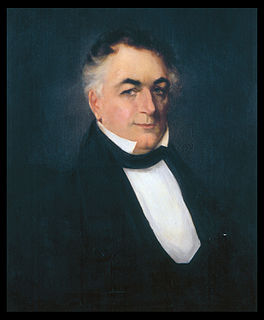
James Clark was a 19th-century American politician who served in all three branches of Kentucky's government and in the U.S. House of Representatives. His political career began in the Kentucky House of Representatives in 1807. In 1810, he was appointed to the Kentucky Court of Appeals, where he served for two years before resigning to pursue a seat in the U.S. House of Representatives. He served two terms in that body, resigning in 1816.

Kentucky was a border state of key importance in the American Civil War. It officially declared its neutrality at the beginning of the war, but after a failed attempt by Confederate General Leonidas Polk to take the state of Kentucky for the Confederacy, the legislature petitioned the Union Army for assistance. After early 1862 Kentucky came largely under Union control.
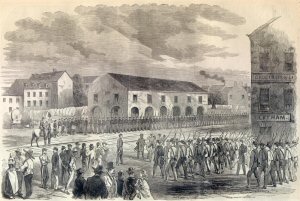
The city of Winchester, Virginia, and the surrounding area, were the site of numerous battles during the American Civil War, as contending armies strove to control the lower Shenandoah Valley. Winchester changed hands more often than any other Confederate city.

John James Davis was an attorney and politician who helped found West Virginia and later served as a United States Representative in Congress from that state.

The Confederate government of Kentucky was a shadow government established for the Commonwealth of Kentucky by a self-constituted group of Confederate sympathizers during the American Civil War. The shadow government never replaced the elected government in Frankfort, which had strong Union sympathies. Neither was it able to gain the whole support of Kentucky's citizens; its jurisdiction extended only as far as Confederate battle lines in the Commonwealth. Nevertheless, the provisional government was recognized by the Confederate States of America, and Kentucky was admitted to the Confederacy on December 10, 1861. Kentucky, the final state admitted to the Confederacy, was represented by the 13th (central) star on the Confederate battle flag.

The RestoredGovernment of Virginia was the Unionist government of Virginia during the American Civil War (1861–1865) in opposition to the government which had approved Virginia's seceding from the United States and joining the new Confederate States of America. Each government regarded the other as illegitimate; the Restored Government had de facto control of the state's northwest until, with its approval, the area became West Virginia in mid-1863. Since the Restored Government and West Virginia mutually recognized each other, the former government thereafter became in large part a government in exile. Until the end of hostilities, most of its de jure territory remained controlled by the secessionist state government, which never recognized either Unionist state government operating within its antebellum borders. Furthermore, since the Restored Government's claimed territory not under secessionist control only remained so by force of arms it was placed under Federal martial law, thus further limiting the authority of the Unionist civilian government.

George Henry Chapman was an American sailor, newspaper editor, lawyer, and soldier. He served in the United States Navy during the Mexican–American War and as a Union Army general during the American Civil War. Later in life he was a judge and a state legislator.
Isaac Parsons was an American planter, politician, and military officer in the U.S. state of Virginia. Parsons served as a Justice of the Peace of Hampshire County's District 3 from 1852 to 1853. He later served as a member of the Virginia House of Delegates representing Hampshire County from 1854 until 1857. Parsons was the grandson of Virginia House Delegate Isaac Parsons (1752–1796), the great-grandson of Colonial Virginia military officer William Foreman, and the grandfather of First Lady of West Virginia, Edna Brady Cornwell (1868–1958).
References
- 1 2 3 4 5 6 7 8 9 10 Connon, David (2014). "James H. Williams". Iowa Heritage Illustrated.
- 1 2 3 Thomas Kemp Cartmell (1909). Shenandoah Valley Pioneers and Their Descendants: A History of Frederick County, Virginia (illustrated) from Its Formation in 1738 to 1908. Eddy Press Corporation. p. 504. ISBN 9780722246306.
- 1 2 3 4 5 "James Harrison Williams". The Iowa Legislature. Retrieved November 8, 2019.